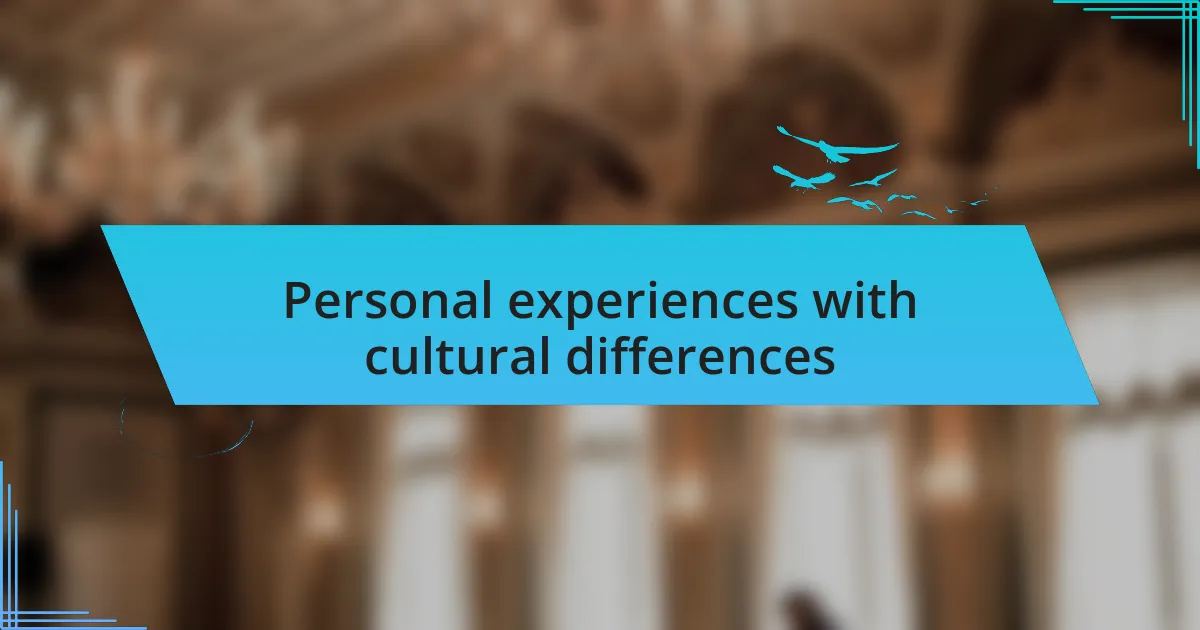Key takeaways:
- Cultural differences in hospitality significantly impact guest experiences, shaping interactions, traditions, and overall atmosphere in hotels.
- Personalized services that reflect local customs, such as greeting gestures or communal dining, enhance the connection guests feel to their surroundings.
- Engaging with cultural practices, like traditional activities or local dietary preferences, fosters community and enriches travel experiences.
- Small gestures of hospitality, such as offering welcome drinks or using local decor, can create lasting memories and evoke a deeper appreciation for cultural nuances.

Understanding cultural differences
Cultural differences can profoundly shape our experiences in hotel accommodation. I recall a time when I traveled to Japan and was struck by the emphasis on politeness. The way staff bowed and greeted guests with such sincerity made me reflect on how often we overlook simple gestures in my own culture. Isn’t it fascinating how such differences can create unique atmospheres in hospitality?
I also learned that dining customs vary widely across cultures. One evening in Italy, I found myself bewildered when my host insisted the meal would start only after everyone was served. This tradition, emphasizing community and togetherness, transformed a simple dinner into a cherished experience. Have you ever considered how these cultural nuances can transform your stay into something memorable?
Engaging with these differences often invites personal growth. For instance, during a stay in a Middle Eastern country, I became aware of the importance of hospitality traditions, such as offering coffee or tea upon arrival. It made me appreciate the deep-rooted customs that define a culture, turning each interaction into an opportunity for connection. How do you think embracing these cultural insights can enhance your own travel experiences?

Importance of cultural awareness
Cultural awareness plays a crucial role in shaping a guest’s experience. I vividly recall my visit to a hotel in Thailand, where the staff dressed in traditional attire. Their pride in their culture was palpable and instantly made me feel welcomed. How often do we consider that the uniform isn’t just a service tool, but a representation of a culture?
In another instance, while staying in a hotel in Mexico, I learned the importance of family in hospitality. The owner shared stories of how family gatherings influenced the hotel’s décor and services. It struck me that understanding these cultural backgrounds can lead to a richer appreciation for the spaces we inhabit. Doesn’t it make you wonder how our own familial customs might influence the way we experience hospitality?
Being culturally aware can significantly enhance our interactions and enrich our travels. For example, while staying in a Scandinavian hotel, I engaged in a practice of “hygge,” which emphasizes coziness and comfort. This unique perspective transformed my brief stay into a calming retreat. Have you ever experienced moments like this that made you rethink your own definitions of comfort and hospitality?

Impact on hotel accommodation
Hotels are often influenced by the cultural expectations of their guests, which can shape everything from service styles to room designs. I once checked into a traditional ryokan in Japan, where the emphasis on simplicity and nature in the decor truly embodied the local ethos. This experience made me reflect on how cultural nuances can significantly impact the overall environment of a hotel, creating a unique atmosphere that resonates with the essence of a place. Wouldn’t you agree that a hotel can be much more than just a place to sleep?
Additionally, the approach to hospitality varies dramatically across cultures. During a stay at a resort in the Caribbean, I encountered the concept of “liming,” which emphasizes relaxation and socialization. The staff engaged guests in daily activities, fostering a sense of community that transcended the typical transactional nature of hotel stays. This taught me that integrating local customs into hotel operations can create an inviting atmosphere that encourages guests to embrace the local culture. How could we leverage such practices in other travel contexts to enhance guest experiences?
Finally, attention to dietary preferences rooted in cultural traditions has become increasingly vital in the hotel industry. When I dined at a hotel in India, the attention to vegetarian cuisine showcased not just a menu choice, but a deep respect for local customs and beliefs. It illuminated the idea that hotels can cater to diverse culinary needs, which can be a game changer for travelers. Have you ever noticed how food can enhance the connection we feel with a place?

Adapting services to cultural needs
Adapting services to meet cultural needs is essential for hotel success. I remember staying at a hotel in Morocco where the staff took great care to provide guests with an authentic experience. They offered mint tea upon arrival, which made me feel welcomed and immersed in the local customs right from the start—an example of how small gestures can make a big impact on guests’ perceptions.
What stands out to me is the importance of language and communication styles in hospitality. During a stay in a multilingual hotel in Switzerland, I saw how staff members personalized their greetings in various languages, which not only made guests feel appreciated but also fostered a sense of belonging. This experience made me realize that understanding language preferences can elevate the guest experience, allowing them to connect more deeply with the hotel and its services.
Moreover, aesthetic choices reflecting local culture can significantly enhance the overall ambiance of a hotel. While visiting a boutique hotel in Thailand, the decor featured vibrant textiles and art that celebrated Thai heritage. This thoughtful curation not only enriched my stay but also reminded me of the value of creating an environment that tells a story. How can hotels better incorporate local art or architecture to offer guests a more immersive experience?

Examples of cultural preferences
When I checked into a hotel in Japan, I was struck by the emphasis on cleanliness and organization. Guests were provided with slippers to wear indoors, and even the bathing ritual was portrayed as an essential part of the experience. It made me reflect on how cultural norms shape our expectations of hospitality; I found that this attention to detail not only created comfort but also conveyed a deep respect for traditional customs.
During a trip to Brazil, I was surprised by the importance of family-style dining at a local hotel. Meals were served in large platters, encouraging guests to share and converse as if they were part of a large family gathering. This communal approach transformed my dining experience, making it feel more like a celebration. I wondered, how often do hotels consider the power of shared experiences to foster connections among guests?
In contrast, my stay in a hotel in Germany highlighted the cultural preference for privacy and personal space. Each room had clearly defined boundaries, with thoughtful touches like individual balconies and soundproofing. I appreciated this level of consideration, as it allowed for quiet reflection amidst travel. It made me think about how essential it is for hotels to balance cultural differences, ensuring that while they respect regional traditions, they also cater to individual preferences in the guest experience.

Personal experiences with cultural differences
During a stay in a hotel in Morocco, I was immersed in the vibrancy of local culture that truly enhanced my experience. The welcome mint tea and the intricate tilework in the lobby immediately made me feel at home, yet it also inspired me to appreciate the broader context of hospitality. I found myself asking, how do rituals like these forge deeper connections between guests and their surroundings?
I recall an unforgettable evening in a Turkish hotel where the staff organized a traditional dance night. As I watched locals perform, I couldn’t help but feel the energy in the air—it was infectious. This experience served as a reminder that cultural expressions can create lasting memories, and I often think about how hotels might harness such moments to make stays more memorable and engaging.
Another poignant experience was during my visit to a hotel in Thailand, where I was greeted with a traditional ‘wai’ gesture. This simple yet profound sign of respect made me reflect on the role of gestures in creating a welcoming atmosphere. It prompted me to consider, when we travel, how much can a small act influence our perception of a place? Such interactions can transform a routine hotel stay into a personal journey that resonates long after the visit.

Lessons learned from cultural interactions
Cultural interactions in hotel settings have taught me that warmth transcends language. I had a fascinating moment in a Japanese inn when the staff practiced their limited English to make sure I felt comfortable. Their effort, combined with their innate politeness, made me realize how communication is more than just words; it’s about sincerity and connection. Isn’t it interesting how a simple smile can convey a world of understanding?
I recall a time in a Spanish hotel where breakfast was served family-style. Guests from different countries gathered around a large table, sharing stories and laughter over croissants and coffee. This communal experience highlighted for me how food can bridge cultural gaps and encourage interaction among strangers. It made me wonder if hotels could design more communal spaces to foster these connections.
Reflecting on my stay at a hotel in Brazil, the lively atmosphere of the evening samba class exemplified how cultural activities can break down barriers. I found myself laughing along with other guests, many of whom were hesitant at first. This made me think about how stepping out of our comfort zones can yield rich interactions. Sometimes, it just takes a bit of rhythm to turn a casual trip into a vibrant cultural exchange.